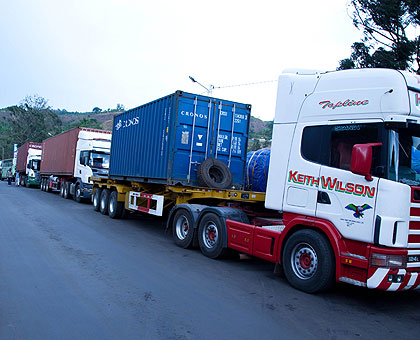Rwandan trucking firms have steadily lost market share over the last five years despite the increase in trade volume within the East African Community, ongoing research jointly commissioned by the Ministry of Trade and Industry and TradeMark East Africa has shown.


Rwandan trucking firms have steadily lost market share over the last five years despite the increase in trade volume within the East African Community, ongoing research jointly commissioned by the Ministry of Trade and Industry and TradeMark East Africa has shown. While Rwanda was one of the largest market players supplying regional freight services to the country in 2007 when it used to command a 21 per cent market share, its share went down to 14 per cent in 2012 as a result of competition from truckers in neighbouring countries, especially Tanzania.When Rwanda held a 21 per cent share of the market in 2007, Tanzania and Uganda held 22 per cent and 20 per cent, respectively, followed by Kenya at 15 per cent, DR Congo on 9 per cent and Burundi on 3 per cent. But the situation changed in 2012, and Rwanda remained with 14 per cent of the local market share, while Tanzania is now the dominant market player with 40 per cent, followed by Uganda (14 per cent) and Kenya and Congo on 14 per cent. Jonathan Argent, a consultant who conducted the study titled, "Rwanda’s Road Freight Industry Competitiveness Study”, Tanzanian truckers have taken advantage of good road tolls charged in Rwanda and incentives on their business back home to maximise the opportunity to supply the Rwandan growing market. "The dominance of Tanzania is driven by the rise in the share of Rwanda’s trade transitioning through Rusumo, which Tanzania has captured completely,” Argent said in a presentation during a validation meeting at the Ministry of Trade this week. "Road freight across Rwanda’s borders has increased dramatically. The lion’s share of the growth comes via Rusumo, and almost all of this is carried by Tanzanian firms.” The researcher concluded that "current road tolls and the rise of the central corridor importance explain most of the fall in Rwandan transporters market share.” While Rwandan truckers are charged $500 (about Rwf325,000) to be able to use Tanzania’s roads (road tolls), Tanzanian truckers are only charged $152 (about Rwf98,000) in road tolls when they come to Rwanda, leaving Rwandan trucking firms in a competitive disadvantage to supply the Rwandan market. "There’s got to be a fair operating environment for everyone,” Argent said.The road toll barrier While the consultant suggests that Rwanda can benefit by removing road tolls in its policies to drive Tanzania’s road toll price for Rwandan truckers down to $152, Kigali might not be ready to give up some $7.8 million (about Rwf5 billion) she collects in road tolls every year. "This is something that can take a while,” said Emmanuel Hategeka, the permanent secretary in the Ministry of Trade and Industry. Hategeka said removing road tolls would first have to respond to the questions of where else Rwanda would get $7.8 million and it would need the enactment of various enabling laws. The money is critical for maintaining the country’s roads, contributing 27 per cent of road fund. The Secretary-General of Truckers Association of Rwanda, Théodor Murenzi, urged the removal or reduction of road tolls paid in regional countries. "We are still considered as foreigners even if the Common Market Protocol says that no one should be seen as such within the EAC,” Murenzi said. He also asked that Rwanda lifts the ban on heavy right hand driving vehicles because importing European-made heavy left hand driving vehicles remains more expensive while heavy right hand drive vehicles imported by other investors in the EAC from Asia are relatively cheaper. The final report will be sent to the Cabinet next month for consideration. The Minister of Trade and Industry, François Kanimba, said government will keep exploring ways of removing barriers to regional trade and common market."There is need for real fairness and equity as we move towards establishing the common market,” he said. The EAC Customs Union Protocol bars partner states from enacting legislation or applying administrative measures which directly or indirectly discriminate against similar products of other partner states.


